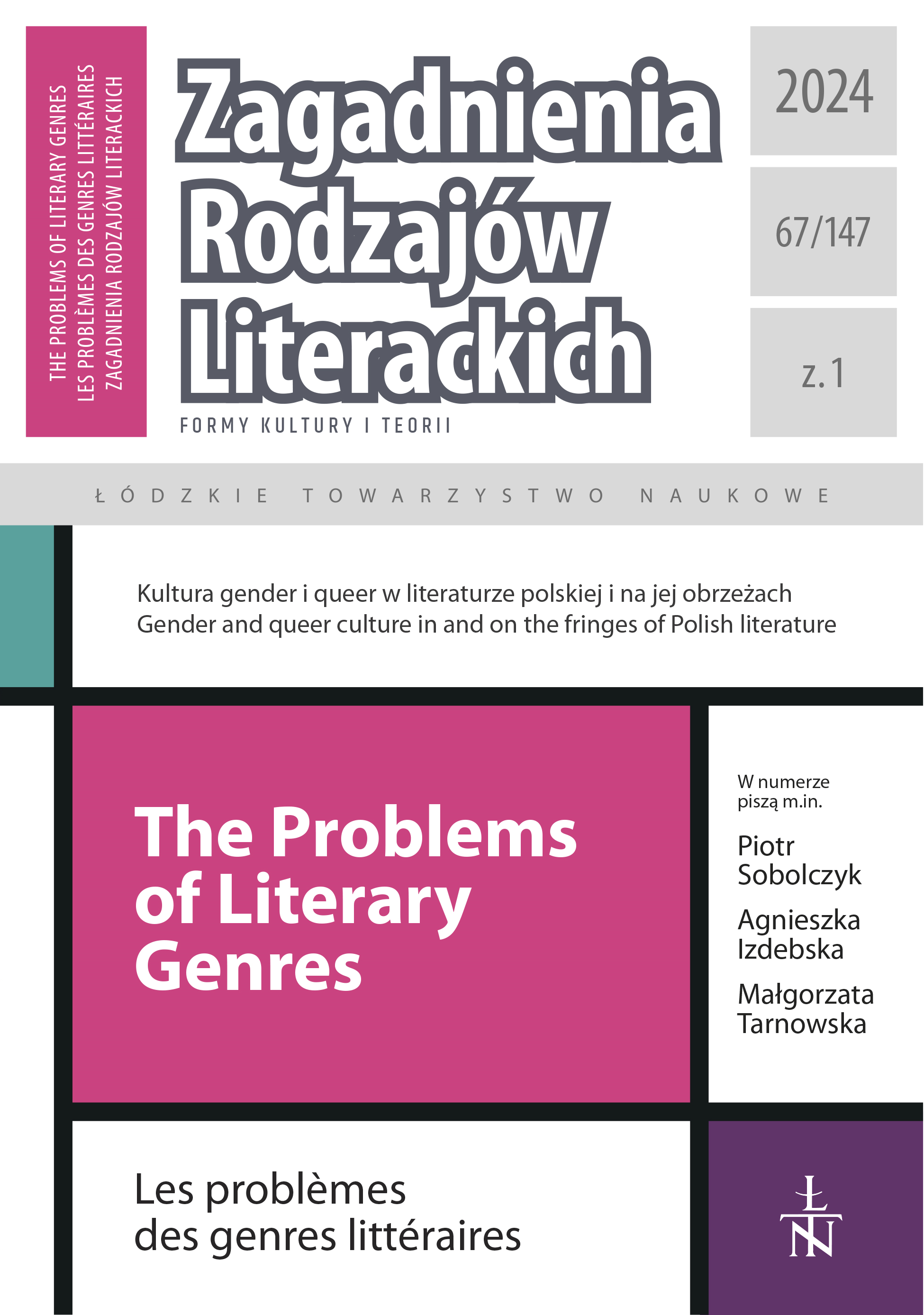Spirala i narodziny. O wczesnej poezji Izabeli Morskiej
DOI:
https://doi.org/10.26485/ZRL/2024/67.1/2Słowa kluczowe:
feminism; queer poetry; the Gothic; rape; motherhoodAbstrakt
The article analyses Izabela Morska’s collection of poems 1983. Maszynopisy published in 2023. At first the author analyses the idea of “regained” poems (all written between 1980– 1985 and never published until now) and the “regained decade” in the history of Polish feminine poetry. Morska was a female dissident, a phenomenon quite suppressed in the history of the Solidarity movement. She also participated in an unofficial literary life with other girls who were also poets, andb sometimes her lovers. The beginning of the article analyses this topic according to Morska’s introductory essay. The author offers in the article the idea of “spiral regaining” Morska’s youth (alluding to the title of her first published book, Death and Spiral). As for female writers who were Morska’s peers, the author mentions Anna Janko and most of all Eda Ostrowska. Subsequently three main topics are studied. 1) The idea of a “national hero” and dissident who could never be a woman. Morska was aware of her exclusion as a woman from the dominant dissident movement and also from literary life, and these two overlapped. Especially the long poem King of Rats IV is a point in case. 2) The negative motherhood appears in the poems, but also in the cycle of “poems in prose” and is compared to Morska’s gothic novel Alma (written in 1986 and published in 2003). The author suggests in the article that some of these poems in prose constitute “Pre-Alma”. 3) Rape as a metaphor or, rather, symbolization, and its place in the attempt to create a personal and strongly feminine mythology. For Morska, rape might signify sexual harassment (and as such is a recurring theme in Death and Spiral, Absolute Amnesia, Alma…), but also metaphorically any kind of movement, including birth and death leading to rebirth, marked with violence. Symbolization is defined in the article according to Jean Laplanche and Marguerite Sechehaye.
Liczba pobrań
Bibliografia
Amenta Alessandro (2017), Tradurre il genere: „Madame Intuita” di Izabela Filipiak, „Kwartalnik Neofilologiczny” nr 4.
Budrowska Kamila (2000), Kobieta i stereotypy. Obraz kobiety w prozie polskiej po roku 1989, Trans Humana, Białystok.
Drzewucki Janusz (2013), Oto stoję w deszczu ciała (recenzja), „Rynek Książki”, rynek-ksiazki.pl/recenzje/oto-stoje-w-deszczu-ciala [dostęp: 12.02.2024].
Filipiak Izabela (2002), Madame Intuita, NowyŚwiat, Warszawa.
Filipiak Izabela (2003), Alma, Wydawnictwo Literackie, Kraków.
Filipiak Izabela (2005a), Księga Em, Wydawnictwo tCHu, Warszawa.
Filipiak Izabela (2005b), Listy znad Zatoki… Gdańskiej, „Kobiety Kobietom”, kobiety-kobietom.com/filipiak/art.php?art=2230 [dostęp: 12.12.2023].
Filipiak Izabela (2006a), Magiczne oko. Opowiadania zebrane, W.A.B., Warszawa.
Filipiak Izabela (2006b), Obszary odmienności. Rzecz o Marii Komornickiej, Słowo/obraz terytoria, Gdańsk.
Grochowiak Stanisław (1978), Wiersze wybrane, Czytelnik, Warszawa.
Janion Maria (1975), Gorączka romantyczna, Państwowy Instytut Wydawniczy, Warszawa.
Janion Maria (1976), Wojna i forma [w:] Literatura wobec wojny i okupacji, red. M. Głowiński, J. Sławiński, Ossolineum, Wrocław.
Kaliściak Tomasz (2008), „Śmierć mężczyzny”. Konstrukcja płci w poezji Rafała Wojaczka [w:] Ciało/Granice/Kanon. Studia, red. J. Olejniczak, M. Rygielska, Wydawnictwo Para, Katowice. Karta (b.r.), karta.org.pl/nas [dostęp: 10.12.2023].
Kuczyńska-Koschany Katarzyna (2008), Miłobędzka, macierzyństwa [w:] Miłobędzka wielokrotnie, red. P. Śliwiński, Wojewódzka Biblioteka Publiczna i Centrum Animacji Kultury w Poznaniu, Poznań.
Laplanche Jean (1980), Problématiques II. Castration et symbolisations, PUF, Paryż.
Lipska Ewa (1993), Wakacje mizantropa. Utwory wybrane, Wydawnictwo Literackie, Kraków.
Lisowski Jerzy (2006), Antologia poezji francuskiej. Anthologie de la poésie française, Czytelnik, Warszawa.
Love Heather (2007), Feeling Backward Loss and the Politics of Queer History, Harvard University Press, Cambridge.
Maanam (1981), Oddech szczura, „Tekstowo.pl”, www.tekstowo.pl/piosenka,maanam,oddech_szczura.html [dostęp 12.12.2023].
Miłobędzka Krystyna (2006), Zbierane 1960–2005, Biuro Literackie, Wrocław.
Morska Izabela (1986), Notatki do pracy magisterskiej [niepublikowane].
Morska Izabela (2016), Glorious outlaws. Debt as a Tool in Contemporary Postcolonial Fiction, Peter Lang, Frankfurt nad Menem.
Morska Izabela (2019), Znikanie, Znak, Kraków.
Morska Izabela (2021), Sekret rodziny kociej, Stowarzyszenie Lambda, Warszawa.
Morska Izabela (2023), 1983. Maszynopisy, Dom Literatury w Łodzi, Łódź.
Orr Bek J. (2021), Introduction: Feminist Engagements With the Queer ArchiveIntroduction: Feminist Engagements With the Queer Archive, „Journal of Feminist Scholarship” nr 19, DOI:10.23860/jfs.2021.19.01.
Sechehaye Marguerite (1947), La réalisation symbolique (Nouvelle méthode de psychothérapie appliquée a un cas de schizophrénie), „Revue suisse de psychologie et de psychologie appliquée” nr 12.
Sobolczyk Piotr (2017), G(n)o(s)tycyzm. Female queer gothic, gnoza i dyskurs o kobiecej potworności [w:] P. Sobolczyk, Gotycyzm — modernistyczny sobowtór odmieńca, Fundacja Terytoria Książki, Gdańsk.
Sobolczyk Piotr (2024), [Recenzja tomu „1983” Izabeli Morskiej], „Replika” nr 1–2.
Sołtys Edyta (2010), Edy Ostrowskiej drogi do religijności, „Pamiętnik Literacki” nr 1.
Szopa Katarzyna (2021), Zaklęta wyobraźnia. Czarownice polskiej poezji kobiet lat 60., 70. i 80., „Czas kultury” nr 2.
Świerkosz Monika (2014), W przestrzeniach tradycji. Proza Izabeli Filipiak i Olgi Tokarczuk w sporach o literaturę, kanon i feminizm, Instytut Badań Literackich PAN, Warszawa.
Świerkosz Monika (2015), Arachne i Atena. W stronę innej poetyki pisania kobiecego, „Teksty Drugie” nr 6.
Warkocki Błażej (2013), Siostra Herberta [w:] B. Warkocki, Różowy język. Literatura i polityka kultury na początku wieku, Krytyka Polityczna, Warszawa.
Wojaczek Rafał (2002), Chodzę i pytam. Wybór wierszy, wyb. i oprac. Z. Fedecki, Libros, Warszawa.
Pobrania
Opublikowane
Jak cytować
Numer
Dział
Licencja
Prawa autorskie (c) 2024 Łódzkie Towarzystwo Naukowe i autorzy

Utwór dostępny jest na licencji Creative Commons Uznanie autorstwa – Użycie niekomercyjne – Bez utworów zależnych 4.0 Międzynarodowe.







